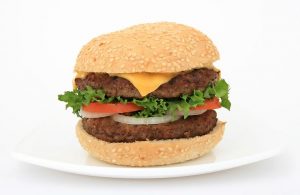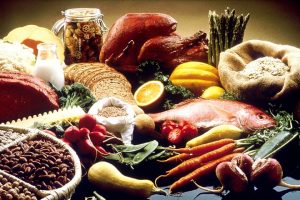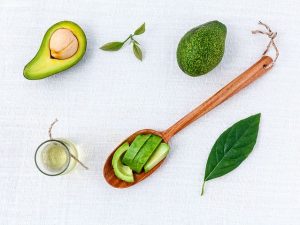Diets for losing weight have become such a part of our culture that it’s second nature to mentally evaluate the approximate fat content in any food before deciding whether or not to eat it. Even when someone goes for it and indulges in that pile of french fries or buttery croissant, societal programming kicks in with a guilt trip. Dieters rejoice: this article has been written to explain the important role fat plays in staying healthy and to help you break free from the fallacy of fat-free indoctrination.
Diet Healthy: Include Fat

Eating fat doesn’t make you fat. Burning fewer calories than you consume–from any type of food–is the issue.
The news sounds too good to be true, and yet it is. A study published in the American Journal of Medicine found that high-fat diets weren’t to blame for excess body fat. Additionally, the research concluded that weight loss diet programs that reduced fat intake weren’t the solution for quick weight loss — or any type of weight loss, for that matter. In fact, HelpGuide.org reports that the nation’s obesity rates doubled during the height of America’s fanaticism over low fat diets. Though recommendations from professionals such as doctors and personal trainers used to be to cut the fat, that’s now considered outdated advice. These days, the smart money is on eating a balanced diet. So, logically, to diet healthy, you have to eat some fat.
Fact: Your Body Needs Fat
Those who have struggled with cutting fat to accommodate a quick weight loss diet will be gratified to know that there’s a reason they crave fat. It’s not just in your head: you really do need fat and can’t live without it. According to Medical News Today, fat is a nutrient that your body requires to function normally. Fat gives you energy and helps other nutrients work properly, too. Harvard Health lists some other important things fat does for your body such as:
- assisting in muscle movement
- helping build cells
- reducing inflammation and decreasing joint pain
- helping your blood to clot
Additionally, certain kinds of fats can help reduce serious injuries, such as fractures. So, you get it: your body needs fat. However, though sometimes it feels like making fat is what your body does best, it actually doesn’t produce some of the most essential fats it requires. That means you have to get them from your diet.
Ah, but how much fat do you need? The CDC used to say that adults over the age of 19 should get 25 to 30 percent of their caloric intake from fats. Guidelines have recently been revised to recommend oils instead of eating solid fats, but the 25 to 30 percent guideline still applies in general, depending on your age or whether your a man or a woman.
Naturally, you should follow your doctor’s advice if he recommends a lower fat intake for you due to health concerns, but you still need fat even if you’re on a weight loss program. The Journal of the International Society of Sports Nutrition published a study that recommended that natural bodybuilders get between 15 and 30 percent of their daily calories from fat. So, if a bodybuilder who is trying to eliminate as much body fat as possible is still supposed to get at least 15 percent, the average person trying to lose weight can be successful on the lower end of the non-competitor’s scale by getting between 20 and 25 percent of their daily calories from fat.
Sorting the Good From the Bad
Simply eating all types of fat, wherever and whenever you can get it isn’t a smart dieting strategy, nor is it healthy. So what is a healthy diet that includes fat? It’s one in which you use oils instead of solid fats when possible. Yes, that means dipping a crusty hunk of French bread in olive oil and herbs is an acceptable and healthy alternative to slathering it with butter or margarine. The best fats for a healthy diet have little or no trans fats and are monounsaturated or polyunsaturated. Dr. Mercola says that even some saturated fats are healthy, if they’re naturally saturated and not hydrogenated. These types of oils aren’t just better for you; they’re literally good for you. They can
- help lower your cholesterol
- curb hunger by making you feel satisfied
- decrease risk of heart disease
- enhance your immune system
- improve your metabolism
- support weight loss
Non-hydrogenated olive, sunflower, coconut and safflower oils are all healthy fats, as are the fat from avocados, nuts and fish. Get most of your 25 to 30 percent from these sources and try to stay below 300 mg of cholesterol, and you’ll do well.
Common Sense: The Best Way to Lose Weight

Use common sense. Eat a variety of foods–including fat–in moderation instead of overdoing some and eliminating others.
Isn’t it funny how when people hear something is bad for them, they go overboard avoiding it altogether, and when something is good for them they do the opposite and overdo it? The experts and the studies may point to fat as being necessary, good for you, and effective for losing weight, but that doesn’t equal permission to go on a full-fat diet. The best way to lose weight is to maintain control and focus on moderation. Eat all types of foods, not eating too much of any one type. Try to eat healthy fats when you can and be sure to get enough protein, too. When you toss fruits, veggies and grains into the mix, you’ll finally be on a diet that is satisfying and doesn’t make you feel bad for eating what comes naturally.



Pingback: Real Food Will Rock Your Weight Loss | Targitfit Blog
Pingback: Happy Healthy Holidays | Targitfit Blog